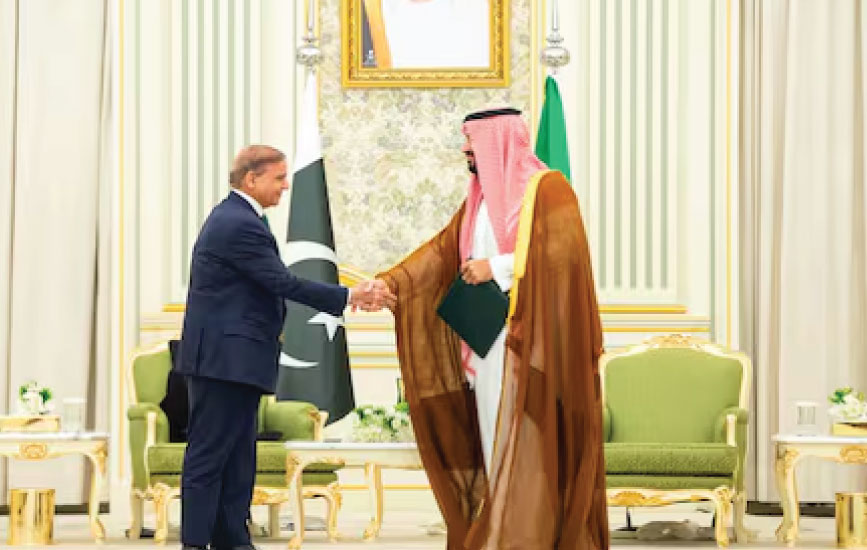Following the signing of the Pakistan–Saudi Strategic Mutual Defence Agreement (SMDA) in September 2025, under which “any aggression against either country shall be considered an aggression against both,” several misleading speculations emerged to misguide the emerging discourse on the issue. After this agreement, certain media narratives have speculated that Pakistan has expanded its nuclear umbrella to Saudi Arabia.
These interpretations are not only inaccurate but out of context as well. There is no doubt that Pakistan’s nuclear doctrine is still defensive, India-centric, and is based on full-spectrum deterrence. It is misleading to assert that Islamabad has committed to offering nuclear safeguards to any other nation, including Riyadh, as nuclear assets cannot be exported, shared, or operationalised outside of the sovereign authority of Pakistan as a matter of our national policy.
Since the beginning of its nuclear program, Pakistan has always maintained that its nuclear weapons serve as a deterrent vis-à-vis archrival India to ensure regional peace. After India’s 1974 nuclear test, which drastically changed the balance of regional security, Pakistan was compelled to acquire nuclear weapons due to the emerging threat from India. Based on credible minimum deterrence, the goal of full-spectrum deterrence, which has developed over time, is to address all possible threats to Pakistan’s territorial integrity and sovereignty. It is important to note that this framework is state-centric; it is not intended to provide nuclear protection to other countries, but rather to deter aggression against Pakistan.
Historically, Pakistan’s defense agreements with the United States during the Cold War under the Southeast Asia Treaty Organization (SEATO) 1954 and the Central Treaty Organization (CENTO) 1955, these alliances did not ensure any military involvement during Pakistan’s wars with India in 1965 and 1972, highlighting the limitations of formal treaties of that kind. Similar to this, the recent Saudi-Pakistan agreement needs to be interpreted in its proper context. It is a political declaration of solidarity and strategic cooperation that fortifies bilateral ties, reflecting Pakistan’s successful diplomacy and increasing reputation as a responsible regional actor capable of promoting collective security. Nuclear guarantees have never been included in any of Pakistan’s previous defence agreements, and this one is no exception.
It’s also critical to remember that Pakistan is not the only country with defence cooperation agreements. For example, without extending nuclear protection or merging their arsenals, the United States has signed several bilateral and multilateral defence pacts with nations including Japan, South Korea, Australia, and NATO allies. In the same way, Pakistan and Saudi Arabia’s defence pact is based on strategic cooperation and mutual security coordination rather than a nuclear sharing pledge. Pakistan’s agreement is therefore neither unusual nor concerning; rather, it is in line with the international standard for sovereign states to cooperate in defence diplomacy to strengthen stability and deterrence. As the result of this agreement now both states are compelled to provide comprehensive security to each other against all emerging and traditional threats. Resultantly, Saudi Arabia would provide all sorts of support to Pakistan, if India dares to attack Pakistan even launching a limited war.
The government’s official stance on nuclear deterrence is still unambiguous: it is solely intended to protect Pakistan’s sovereignty against outside aggression, especially from India. The concept excludes extended deterrence plans for any nation or area outside South Asia. Pakistan’s nuclear assets are safe, centralised, and used only in compliance with well-defined state policy due to the command-and-control system established over many years of institutional experience under the National Command Authority (NCA) and Strategic Plans Division (SPD). Because of these strong, technologically sophisticated, and fiercely protected mechanisms, it is impossible to extend nuclear guarantees unauthorized or politically motivated.
Pakistan already has 170 nuclear weapons, and any departure from its external obligations might put a burden on its financial resources and may upset its meticulously balanced security stance. Extending a nuclear umbrella to Saudi Arabia would run the risk of upsetting Pakistan’s own regional deterrent balance and potential sanctions from major powers.
As discussed above, it is clear that Pakistan’s defence cooperation with Saudi Arabia is a continuation of its pragmatic and autonomous security strategy, not a move towards extended nuclear deterrence. In accordance with international standards, Pakistan’s defence alliances, like those of other countries, such as the United States and its allies, work to improve political trust and mutual security. Misunderstandings resulting from speculative media reports need to be handled carefully. Pakistan has long vowed to be a responsible nuclear state and a stabilizing influence in South Asia. Islamabad’s defence partnerships should not be misinterpreted as instruments of extended deterrence, but must be understood through the symbolic shield of brotherhood.



